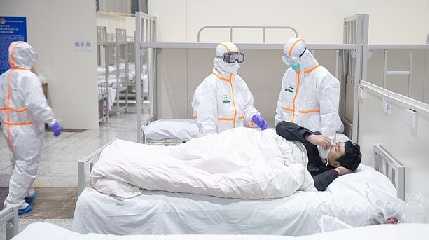
BEIJING (AP) — China on Wednesday reported a major drop in local COVID-19 infections in the northern city of Xi’an, which has been under a tight lockdown for the past two weeks that has tested the city’s ability to provide supplies for those confined to their homes.
With the Beijing Olympics beginning Feb. 4, China is doubling down on measures to prevent any new outbreak that could affect proceedings.
People are being told to travel in and out of Beijing only if they absolutely need to and hotels have largely stopped taking new reservations. Athletes, officials and journalists are entering an “anti-pandemic” bubble as soon as they arrive and will remain within it until the Feb. 4-20 Winter Games are over.
No fans from outside China are permitted and most of the spectators are expected to be drawn from schools, government offices and the military rather than the general public.
Underscoring the importance of the event, Chinese President and Communist Party leader Xi Jinping visited Olympic sites around the capital on Tuesday, including the main media center.
“Staging major international sporting events such as the Winter Olympics will be an opportunity to enhance the influence of Chinese culture, the reach of news reporting and the nation’s soft power,” Xi was cited as saying by the official Xinhua News Agency.
Outbreak concerns add to controversies that have dogged the Games over China’s human rights records, with the U.S. and close allies announcing a diplomatic boycott. Xi is seeking to be appointed to a third five-year term as leader this year and is eager to avoid any development that could tarnish his reputation.
The National Health Commission on Wednesday announced just 35 new cases in Xi’an, home to the famed Terracotta Warriors statues along with major industries, down from 95 the day before.
That marks a steady decline since daily new cases topped 100, prompting officials to retain and in some cases tighten restrictions on people leaving their homes.
Xi’an has seen more than 1,600 cases but no deaths in its latest surge. That’s a small number compared to outbreaks in other countries, a sign that China’s “zero tolerance” strategy of quarantining every case, mass testing and trying to block new infections from abroad has helped it to contain major outbreaks.
China has also vaccinated nearly 85% of its population, according to Our World in Data. The shots have helped reduce the severity of disease, although Chinese vaccines are considered less effective than those used elsewhere.
The lockdowns, however, are far more stringent than anything seen in the West, and they have exacted a tremendous toll on the economy and the lives of millions of people.
Some complaints have been made in Xi’an of food shortages, but officials have defended the measures and pledged to ensure adequate supplies. Some residents are receiving free food packages, while others are ordering food online.
Officials haven’t given a specific date for the lifting of the lockdown.
However, Deputy Director of the city’s Center for Disease Control Chen Zhijun said that would come after Xi’an determined there were no new transmissions among the population at large and the only new cases were among close contacts of those infected who have already been quarantined.
At least two district Communist Party officials in Xi’an have been sacked for failing in their duties to control the outbreak, and a third, the head of the city’s big data management bureau, Liu Jun, has been suspended, Xinhua reported Wednesday.
That came after the city’s health code system that monitors movements and vaccination statuses crashed on Dec. 20 due to high traffic as case numbers were rising, Xinhua said.
Another city, Yuzhou in Henan province, was placed under lockdown over the weekend after the discovery of just three asymptomatic cases.
Only emergency vehicles are allowed on the roads, classes have been suspended and businesses catering to the public have closed for all but essential needs in the city of 1.17 million.
The province of Henan reported two new asymptomatic cases on Wednesday, although it wasn’t clear if they were in Yuzhou, where officials said Wednesday they plan to have 5,000 beds at quarantine sites available within days. Several other cities in the province have ordered mass testing, shut down public venues and restricted or suspended intercity travel, despite only small numbers of cases being detected.
China has reported a total of 102,932 cases nationwide, with the death toll remaining steady at 4,636.




